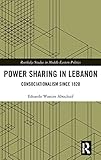Power sharing in Lebanon : consociationalism since 1820 / Eduardo Wassim Aboultaif
نوع المادة : نصالسلاسل:تفاصيل النشر:London : Routledge, 2019وصف:(215 p.)تدمك:
نصالسلاسل:تفاصيل النشر:London : Routledge, 2019وصف:(215 p.)تدمك:- 978-1-138-32935-5
- 956.1
| نوع المادة | المكتبة الحالية | رقم الطلب | رقم النسخة | حالة | تاريخ الإستحقاق | الباركود | |
|---|---|---|---|---|---|---|---|
|
|
Bibliothèque centrale En accès libre | 956.1 / 1241 (إستعراض الرف(يفتح أدناه)) | 1 | المتاح | 000007192005 |
Browsing Bibliothèque centrale shelves, Shelving location: En accès libre إغلاق مستعرض الرف(يخفي مستعرض الرف)
Theoretical framework -- The roots of consociationalism and violence in Lebanon : 1825-1914 -- Greater Lebanon, conscoiationalism and the cultural debate : 1900-1943 -- The rise and fall of Lebanese semi-consociationalism : 1943-1975 -- The long road to consociationalism : 1975-1991 -- Consociational practices in Lebanon : 1991-2015 -- Conclusion - What Can We Learn from Lebanon
This book studies the origins and evolution of power sharing in Lebanon. The author has established a relationship between mobilization, ethnurgy (ethnic identification), memory and trauma, and how they impact power sharing provisions. The book starts with the events in the 1820s, when communities politicized their identities, which led to the first major outbreak of civil violence between the Druze and the Maronites. Consequently, these troubled four decades in Lebanon led to the introduction of various forms of power sharing arrangements to establish peace. The political systems introduced in Lebanon are: the Kaim-Makamiya (dual subgovernorship), a quasi-federal arrangement; the Mutassarifiya, the prototype of a power sharing system; the post-independence political system of Lebanon which the book refers to as semi-consociation, due to the concentration of executive powers in the Presidential office; and finally, the full-consociation of the Taif Republic. In each of these phases, there was a peculiar interaction between the non-structural elements that had a direct impact on power sharing; sometimes this led to instability, and at other times it brought down the system, as in 1840-1860 and 1975. Power Sharing in Lebanon is the first academic work that promotes the influence of non-structural elements that hinder power sharing. This volume is now a key resource for students and academics interested in Lebanese Politics and the Middle East
لا توجد تعليقات على هذا العنوان.












